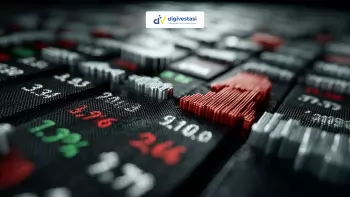
Saham News
Foreign Investors Quietly Buy These 10 Stocks - Check the List!
/index.php
Berita Terkini - Posted on 14 October 2025 Reading time 5 minutes

If the Internet Goes Dark: The Global Impact on Crypto and Stock Markets
Imagine if the global internet connection suddenly went down. What would happen to the cryptocurrency and stock markets?
In today’s digital era, where the global financial system heavily depends on online networks, a worldwide internet outage could trigger severe technical and economic consequences for modern finance.
An internet blackout would immediately halt all digital asset trading activities in the affected regions. Users would be unable to send transactions, withdraw funds, or perform swaps through crypto wallets and exchanges. Without internet access, they wouldn’t be able to send or receive cryptocurrencies or even monitor their investments on exchanges.
However, unlike traditional financial systems, blockchain networks such as Bitcoin and Ethereum would not completely shut down.
According to a report by Cointelegraph, the decentralized nature of blockchain allows transactions and block validations to continue on nodes that remain online, even if other regions lose connectivity.
As a result, cryptocurrencies would remain technically secure within the blockchain ledger, although users might be unable to access them directly. In some extreme cases, crypto enthusiasts have even used alternative technologies — such as radio signals, satellites, or SMS — to broadcast transaction data, though with very limited capacity.
System outages also often occur due to failures in centralized service providers.
For example, when Amazon Web Services (AWS) experienced a major disruption that affected several major crypto exchanges, including Binance and KuCoin, essential functions like fund withdrawals had to be temporarily suspended until systems were restored, CryptoSlate reported. Such incidents serve as a reminder that although blockchain networks operate independently, their reliance on centralized infrastructure remains a critical vulnerability for the crypto ecosystem.
In the stock market, an internet blackout could bring electronic trading activities to a complete halt — from order-matching systems and inter-exchange connectivity to real-time price updates. Without active connections, investors and brokers would lose access to trading terminals and be unable to execute transactions.
A real example of such disruption occurred in August 2013, when Nasdaq experienced a flash freeze caused by a failure in the Securities Information Processor system that transmits price quotes. As a result, trading was suspended for nearly three hours, according to Wikipedia records.
In a broader internet outage scenario, the entire traditional financial system including banks, electronic payment networks, and credit/debit card systems could be forced to shut down. Without connectivity, interbank transfers would fail, clearing systems would be disrupted, and communications between financial institutions would become unstable.
If the internet were to go down, investors would likely seek assets that are more liquid and less vulnerable to technical disruptions.
When both the stock and crypto markets become inaccessible, capital tends to shift toward more stable instruments such as government bonds or physical assets, depending on risk levels and market access.
Several empirical studies have observed a phenomenon known as “flight-to-safety,” where funds move from crypto assets to traditional markets during disruptions or cyberattacks. A 2025 study published by ScienceDirect found that attacks on crypto platforms can trigger temporary capital migration toward defensive stocks as a protective strategy for investors.
However, if a large-scale and prolonged internet outage were to occur, the entire digital economy including capital markets, payment systems, and banking would face severe consequences. In such a situation, the mechanisms of global markets and capital allocation could grind to a complete halt.
Decentralization Doesn’t Mean Immunity
While a global internet blackout remains highly unlikely, localized or regional outages have already occurred several times — exposing real weaknesses in the infrastructure of modern digital finance.
For the crypto market, decentralization provides an additional layer of resilience. However, users’ ability to access their assets still depends entirely on network connectivity. In contrast, the stock market is far more vulnerable, as its trading and communication systems rely completely on stable internet access.
Ultimately, this scenario serves as a reminder that despite the rapid evolution of financial technology, global dependence on the internet remains the greatest systemic risk one that must be carefully anticipated by crypto participants, institutional investors, and financial regulators worldwide.
What do you think about this topic? Tell us what you think. Don't forget to follow Digivestasi's Instagram, TikTok, Youtube accounts to keep you updated with the latest information about economics, finance, digital technology and digital asset investment.
DISCLAIMER
All information contained on our website is summarized from reliable sources and published in good faith and for the purpose of providing general information only. Any action taken by readers on information from this site is their own responsibility.